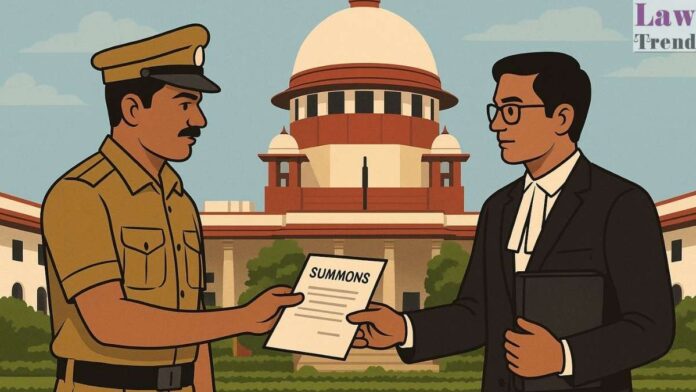The Supreme Court has flagged a critical question for the legal profession and the justice system: Can an investigating agency directly issue a summons to a lawyer representing a party in a criminal case? The issue, which strikes at the heart of attorney-client privilege and the independence of the legal profession, has come to the fore following a recent controversy and judicial pronouncements.
The Court said:
“Legal profession is an integral component of process of administration of justice. Counsels who are engaged in their legal practice have certain rights and privileges guaranteed because of the fact that they are legal professionals, and also due to statutory provisions. Permitting investigating agencies/police to directly summon defense counsel/advocates who advice parties in a given case would seriously undermine autonomy of legal profession and would even constitute a direct threat to independence of administration of justice”
Background: The Gujarat Case
The matter arose from a case in Gujarat, where a lawyer, after representing an accused in a bail plea, was served a notice under Section 179 of the Bharatiya Nagarik Suraksha Sanhita (BNSS) on March 24, 2025. The notice, issued by the Assistant Commissioner of Police (SC/ST Cell, Ahmedabad), asked the lawyer to appear and provide details about the facts and circumstances of a loan transaction between two parties—a case in which the lawyer had acted in his professional capacity.
The lawyer challenged the notice before the High Court, arguing that it violated the sanctity of client-lawyer privilege. The High Court dismissed the plea, but the matter has now reached the Supreme Court, where Justice KV Viswanathan has underscored the gravity of the issue.
Supreme Court’s Prima Facie Observations
Justice Viswanathan, hearing the petition, noted:
“Permitting investigation agencies or police to directly summon defence counsels or lawyers who advised parties in a given case would seriously undermine the autonomy of the legal profession and would even constitute a direct threat to the independence of the administration of justice.”
He further observed that the legal profession is crucial to the administration of justice and that certain rights and privileges are inherent to lawyers as legal professionals. The Supreme Court has now sought the views of the Attorney General, Solicitor General, Chairman of the Bar Council of India, and Presidents of the Supreme Court Bar Association and SCAORA to assist in adjudicating this pivotal question.
Court has restrained State authorities from summoning the counsel who approached it against issuance of notice by the police after he appeared in a bail matter for the accused. Matter now be placed before CJI BR Gavai.
Considering importance of the issue, Court seeks assistance of Attorney General for India, Solicitor General of India, President (and EC) of SCBA and President (and EC) of SCAORA.
Attorney-Client Privilege: The Legal Framework
Indian law, through Section 126 of the Indian Evidence Act, 1872, and now Section 132 of the Bhartiya Sakshya Adhiniyam, 2023, robustly protects all communications between a lawyer and their client made in the course of professional employment. These provisions prohibit an advocate from disclosing any communication made by their client, or the contents of any document they became acquainted with in their professional capacity, without the client’s express consent.
The privilege is considered essential for the administration of justice, as it allows clients to communicate freely and openly with their lawyers without fear of those communications being used against them.
Recent Judicial and Institutional Responses
The issue of summoning advocates has gained national attention after the Enforcement Directorate (ED) issued summons to senior Supreme Court lawyers in connection with cases where they had only provided legal advice. The legal fraternity, including the Supreme Court Advocates on Record Association (SCAORA), condemned the move, and the ED subsequently withdrew the summons and issued a directive: no summons shall be issued to any advocate in violation of lawyer-client privilege except with the prior approval of the Director, ED.
Similarly, the Kerala High Court recently held that police powers under Section 179(1) of BNSS cannot be stretched to summon an advocate representing an accused to divulge information shared between lawyer and client. The court emphasized that such actions infringe upon the client’s right to representation and violate the constitutional rights of legal practitioners. The court unequivocally stated that police have “absolutely no authority” to summon an advocate to disclose privileged communications.




